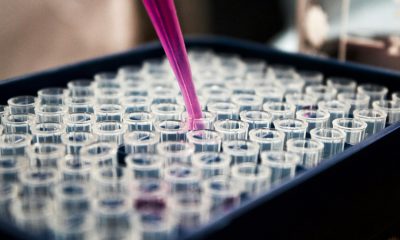Biotech
European Biotechnology Act: Building a Competitive, Innovative, and Ethical Framework
The forthcoming European Biotechnology Act aims to establish a stable, competitive framework to position biotechnology at the heart of Europe’s industrial, healthcare, and economic strategies. MEPs stress simplifying regulations, supporting startups, financing innovation, and ensuring legal certainty. Stakeholders highlight knowledge transfer, AI integration, and global competitiveness, seeking streamlined, ethical, and proportionate rules.

The forthcoming European Biotechnology Act is shaping up to be one of the key pieces of the European Union ‘s legislative agenda in this term. Its objective, in the words of the MEPs leading the debate in Parliament, is clear: to provide Europe with a stable, competitive framework capable of placing biotechnology and life sciences at the center of the industrial, healthcare, and economic strategy of the coming years.
For the rapporteur of the report in the European Parliament (EP), Margarita de la Pisa, a Spanish MEP from Vox, the core of the law is clear. “The objective is to create an attractive space in Europe where the biotechnology sector can develop and compete with third-party players.”
Furthermore, de la Pisa argues that it is necessary to take into account “Europe’s potential in research, prevention, diagnosis, treatment, and personalized medicine.” In her opinion, the goal is to establish regulatory foundations that strengthen public health, promote innovation , and guarantee legal certainty , so that Europe can position itself as a global leader compared to other powers.
Nicolás González Casares, shadow rapporteur and PSOE MEP, shared the strategic vision but went further on the regulatory level. For him, the report prepared by Parliament should serve to “establish standards .” He stressed the importance of sending clear signals to the scientific community and the business sector. “We can be competitive, with regulatory stability, by saying that we do believe in science here.” And he proposed a prioritization criterion that opens a substantive political debate: “Preventive biotechnology must take priority over assistive biotechnology.”
The debate was part of the European series organized by Diariofarma on the impact of the EU legislative agenda on the healthcare and pharmaceutical sectors, sponsored by Johnson & Johnson, Lilly, Novartis, and Pfizer.
The session was moderated by José María López Alemany, director of Diariofarma, and featured the participation of Margarita de la Pisa (Vox, PfE) MEP, rapporteur for the report on biotechnology in the European Parliament; Nicolás González Casares (PSOE, S&D) MEP, shadow rapporteur; Raquel Yotti , PERTE Commissioner for Cutting-Edge Health; and Ion Arocena, Director General of the Spanish Association of Biocompanies (Asebio).
The series’ objective is to offer a space for reflection and analysis on how new European regulations are shaping the future of healthcare and the pharmaceutical industry in Spain and the European Union.
The European Biotechnology Act: A consolidated structure after the amendments
The beginning of the parliamentary process has already left its mark on the text. As De la Pisa explained, once the amendments submitted by the different groups were integrated, a structure has been reached that, although initial, appears to have consolidated and agreed upon the essential aspects.
The MEP explained that the report articulates “the public health aspects of biotechnology and life sciences,” paying special attention to the role of mRNA vaccines and the need for a regulatory framework that enables a swift response. It also includes measures to simplify clinical trials, streamlining procedures that are often excessively complex, as well as a chapter dedicated to technology transfer and innovation financing.
Another section focuses on the importance of supporting startups and SMEs , considered essential to the European biotechnology fabric. It also addresses the ethical and legal implications arising from the use of these technologies and sets out the next steps in building a stable and competitive European framework.
Nicolás González Casares
The underlying idea is for Europe to offer clear and stable rules, without the bureaucratic burdens that often delay innovation and limit competitiveness. “On the regulatory front, the general call is for simplification and legal certainty,” De la Pisa emphasized. From his perspective, the balance lies in combining agile procedures with solid standards, avoiding excessively ideological regulation: “There are certain regulations that have been proposed without adequate impact analysis… not everything that is branded as environmental is always beneficial,” he noted.
González Casares agreed on the need for simplification, but with an important caveat to avoid deregulation: “Simplification means carefully examining where we have exceeded our bureaucratic burden ” In his view, it is not about deregulation but rather about streamlining processes so that companies and research centers can operate in a more favorable environment without compromising security guarantees or European values.
The Socialist MEP placed the future law within a context marked by a busy regulatory calendar and an increasingly uncertain geopolitical environment. He noted that the initiative coincides with the negotiations for the pharmaceutical package and the processing of regulations on critical medicines, which, in his opinion, reinforces the need for a specific framework for biotechnology.
Distancing himself from some of the approaches seen in Donald Trump’s United States, he emphasized the importance of ensuring that Europe is seen as a trustworthy place for research and investment. ” We can be competitive, with regulatory stability, by saying that here we do believe in science ,” he noted. In his amendments, he said, he sought specifically to “highlight the role of innovation, development, and knowledge.” ” It’s not Europe First, but Europe Best,” he emphasized, referring to the fact that our continent would be “the best place to invest in this field.”
In his speech, he finally called for the regulatory process to move forward sensibly. ” We’re not aiming for a revolution either.” In this regard, he noted that this is a rapidly growing sector in which regulations must provide certainty and not become a hindrance to innovation.
The role of Spain and the Government’s vision
The Administration’s perspective was represented by Raquel Yotti , who emphasized that the future Law connects with the European Life Sciences Strategy, the national science and innovation strategy that already places Spain in a prominent position on several fronts.
“Biotechnology is science, it is innovation ,” he summed up. He also emphasized the need for European regulation to go beyond creating a common framework, but also serve to strengthen market access, boost competitiveness, and uphold European values regarding ethics and safety.
Raquel Yotti
Yotti framed the future regulation within the need to strengthen Europe’s position in a context of declining competitiveness. ” The objective of this law is to improve Europe’s competitiveness, and here we must start by recognizing our loss of competitiveness ” she stated. In this regard, she explained that the text should facilitate market access for biotech products in a highly fragmented environment, especially in countries like Spain, where the business structure is based on SMEs and micro-SMEs that face additional difficulties in making the regulatory and commercial leap.
She also stressed that any progress must be made ” without renouncing who we are as Europe, our values, and therefore legislation must help maintain the sustainability of this competitive element and orient the biotechnological revolution toward the needs of European citizens,” he argued.
Regarding priority needs, Yotti highlighted the simplification of the regulatory framework, but always within the parameters of rigor and proportionality. “The simplification of the regulatory framework must be done rigorously, conducting impact assessments,” she noted. Yotti noted that healthcare authorization procedures in Europe are “very protective” and must remain so, because they constitute “our hallmark, the protection of the rights of citizens and patients , but in a manner proportional to the risk.”
She also drew attention to the incorporation of new technologies, such as artificial intelligence, into the development of biotechnological products, which requires a well-harmonized regulatory framework capable of responding to these emerging challenges.
In this area, Yotti highlighted Spain’s experience in clinical trials , highlighting the leadership it has achieved in this field. “Spain is in a very interesting position to contribute to the implementation of this legislative package ,” she stated, convinced that the accumulated experience should contribute to the development of multicenter and multi-country trials, supported by infrastructure that integrates the path taken by several Member States.
The vision of the biotechnology sector
Ion Arocena provided the industry’s perspective and noted that the future law is not a new concept, but rather a process that began in 2023 with President Ursula von der Leyen’s State of the Union address and the Commission’s communication on biotechnology and biomanufacturing.
“We welcome the future enactment of this Biotech Act with positive and hope,” he noted, emphasizing that the sector sees the initiative as an opportunity to strengthen competitiveness and correct structural weaknesses.
Ion Arocena
Arocena emphasized that the future Biotechnology Law must address the main weaknesses of the European ecosystem. He elaborated on areas for improvement in Europe as a biotech ecosystem. The first of these is the transfer of knowledge to the productive sector. “We have excellent scientific production indicators, but when we look at innovation indicators, they are not as excellent. The capacity to generate knowledge does not match the capacity to translate that knowledge into technology, innovation, and bring it to market,” he lamented.
Secondly, he pointed out the need to move forward in streamlining and simplifying regulatory frameworks so that products reach the market faster. “That goal, which the Commission also sets out, is to reduce time to market with simpler regulatory frameworks, without compromising safety,” he explained. He also identified access to investment, scalability, and professional training as priorities.
Finally, Arocena emphasized data, artificial intelligence, and supercomputing, which he considered essential elements for accelerating innovation and ensuring the safe use of biotechnology in Europe.
Financing and scalability
The debate on financing recurred in several interventions. Margarita de la Pisa particularly highlighted the financing chapter as one of the most important aspects of the future law. “The financing chapter is very interesting, the search for tailored financing frameworks , not only for each company, but also for each stage,” she explained. The MEP focused on the difficulties in the initial phases, where the European co-financing model requires private contributions of 50%, which, in her opinion, is unrealistic.
The MEP noted that they know that “there are many research projects because we have the talent that has given rise to them, but there is a complexity in technology transfer and in making it truly possible for these solutions to be commercialized.”
Arocena reinforced this assessment with data. Compared to the United States, similar companies “raise a tenth” of their financing, he noted, highlighting the gap that limits European companies’ capacity for growth. According to Arocena, Europe has a problem with both the volume and speed of obtaining this financing, resulting in “lost opportunities because some other geographical areas are ahead of us.” For this reason, he called for a review of any regulatory barriers that are hindering the influx of capital.
On the other hand, Arocena referred to scalability as a priority. In this regard, he explained that Europe generates innovative initiatives, but it is very difficult to grow them, and on many occasions, “they leave Europe because they don’t find the favorable environment for that growth,” he warned. Therefore, he considered a framework necessary that allows innovation to develop and occur in Europe throughout the entire cycle.
For his part, González Casares linked the solution to this issue with greater financial integration at the European level. He noted that without progress in banking and capital union, it will be difficult to mobilize the private funds necessary for the European biotechnology ecosystem to compete on a level playing field with other markets.
Next legislative steps
Regarding the timing of the legislation, MEP Margarita de la Pisa noted that the European Commission has decided to accelerate the process. She explained that the vote in the Health Committee is scheduled for October, and the plenary session of the European Parliament would take place in November.
The debate over the most appropriate regulatory status for the future text was also addressed. While some advocate for a directive that would allow Member States some room for adaptation, others believe that a regulation would provide greater homogeneity and legal certainty, as well as faster adoption. In any case, all agreed that the final instrument must be clear, stable, and proportionate, capable of fostering innovation without jeopardizing confidence in European regulation.
The final part of the discussion focused on how future regulations could contribute to improving knowledge transfer and strengthening the growth of biotechnology companies. For Raquel Yotti, this is one of the clearest deficits in both Spain and Europe.
“We know we are very good at science, but we know that in Spain we have a deficit in transfer,” she noted. She noted that the Ministry of Science is already working on a complementary technology transfer plan with the autonomous communities, and that the PERTE (Perte for Cutting-Edge Health) supports companies with tailored financing tools. “We want health and healthcare innovation to generate economic growth in Spain, which will help us protect the health of our citizens and make us stronger as a country,” she added.
From the industry, Ion Arocena agreed that this should be one of the main objectives of future regulations, although he warned that progress will not be possible without sufficient funding. ” The transfer must then be continuous and capable of supporting these companies in their growth.”
__
(Featured image by Lukas S via Unsplash)
DISCLAIMER: This article was written by a third party contributor and does not reflect the opinion of Born2Invest, its management, staff or its associates. Please review our disclaimer for more information.
This article may include forward-looking statements. These forward-looking statements generally are identified by the words “believe,” “project,” “estimate,” “become,” “plan,” “will,” and similar expressions. These forward-looking statements involve known and unknown risks as well as uncertainties, including those discussed in the following cautionary statements and elsewhere in this article and on this site. Although the Company may believe that its expectations are based on reasonable assumptions, the actual results that the Company may achieve may differ materially from any forward-looking statements, which reflect the opinions of the management of the Company only as of the date hereof. Additionally, please make sure to read these important disclosures.
First published in diariofarma. A third-party contributor translated and adapted the article from the original. In case of discrepancy, the original will prevail.
Although we made reasonable efforts to provide accurate translations, some parts may be incorrect. Born2Invest assumes no responsibility for errors, omissions or ambiguities in the translations provided on this website. Any person or entity relying on translated content does so at their own risk. Born2Invest is not responsible for losses caused by such reliance on the accuracy or reliability of translated information. If you wish to report an error or inaccuracy in the translation, we encourage you to contact us.

-

 Impact Investing4 days ago
Impact Investing4 days agoItaly’s Listed Companies Reach Strong ESG Compliance, Led by Banks and Utilities
-

 Impact Investing2 weeks ago
Impact Investing2 weeks agoBNP Paribas Delivers Record 2025 Results and Surpasses Sustainable Finance Targets
-

 Impact Investing22 hours ago
Impact Investing22 hours agoCDP Approves €1.5 Billion Package to Boost Industry, Renewables, and International Development
-

 Crypto1 week ago
Crypto1 week agoUniswap and BlackRock Partner to Launch BUIDL in DeFi
























